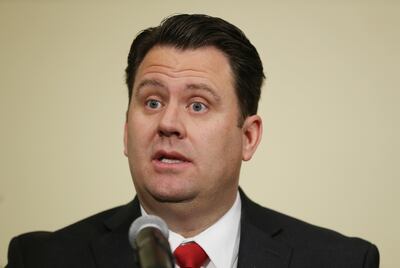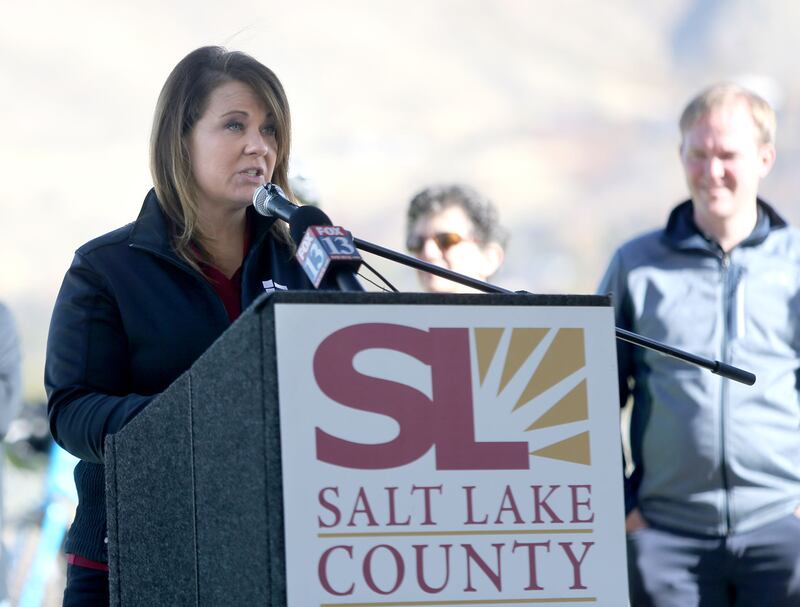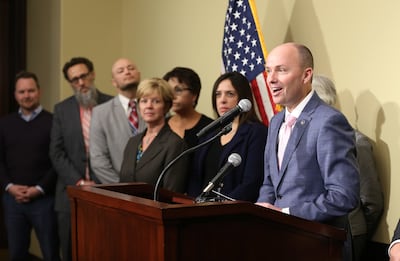SOUTH SALT LAKE — The 300-bed men's homeless resource center in South Salt Lake — already months behind schedule due to prior issues with the city's permitting process — is now just a vote away from landing under state control.
The building's owner, the nonprofit Shelter the Homeless, has run into more trouble with South Salt Lake, this time after the mayor tried to impose "nonnegotiables" within the center's conditional use permit, demanding that the shelter prohibit active drug users from entry, check for and report outstanding warrants, and that the city be reimbursed for all public safety calls if they exceed what the state is already covering, among a long list of other requirements.
It's a list of demands Shelter the Homeless officials also see as "nonnegotiable" — so as the clock runs short, they're turning to the state.

"If we can't come to an agreement, we can't just kick the can down the road and cross our fingers and hope for the best," Preston Cochrane, executive director of Shelter the Homeless, told the Deseret News on Friday.
He said he fully expected the resolution to pass and for the shelter to become a state facility.
"I don't see any other alternative unless certain 'nonnegotiables' are met," he said.
As of Friday afternoon, Cochrane said a majority of Shelter the Homeless' 15-member board have signaled their vote via email to support a resolution to transfer the shelter property to the state. Those votes will need to be ratified at Shelter the Homeless' next board meeting, which could be Sept. 4 or sooner, depending on if the board holds a special meeting.
Lt. Gov. Spencer Cox, a member of Shelter the Homeless' board and a lead state official over homelessness issues, said Friday the resolution was necessary to ensure the resource center opens on time.
"South Salt Lake has drug their feet at many points along this process," Cox said, referring to previous delays during the building permit process.
"I think we all want the same things. We want to make sure this site is finished, runs correctly and we're able to help people get back on their feet, but we don't have significant increases in drugs and violence and things that we've seen plague the Rio Grande area," Cox said. "We wall want the same things, but something has to get done."
Under the resolution, the state would become the "regulator" as the owner of the property, said Jon Hardy, director of the Housing and Community Development Division at the Department of Workforce Services.
That means state officials would no longer need a conditional use permit through the city. Instead, the state would lay out operational terms in a lease agreement, which would likely match conditional use permits already approved for the other two Salt Lake City resource centers, Hardy said.
'Nonnegotiables'
Shelter the Homeless and South Salt Lake Mayor Cherie Wood's administration have been gridlocked over the conditional use permit as it awaits consideration by the city's planning commission. The stalemate came to a head last week when Wood said she learned Shelter the Homeless was poised to file a resolution that would turn the center over to the state, which would sever the city's regulatory power.
Shelter the Homeless demanded South Salt Lake finalize the conditional use permit for the shelter at 3380 S. 1000 West by July 19, or the board would take that step.

A day before that deadline, Wood sent a letter doubling down on the city's requirements and stating the permit would be addressed in an August planning commission meeting, "well in advance of your planned opening in October," Wood wrote.
Wood's "nonnegotiables" within the city's conditional use permit include drawing a hard line against allowing "active illicit drug users" in the shelter, requirements that clients are screened and registered to ensure there are no outstanding arrest warrants that remain unaddressed and that sex offenders are identified at intake.
Friday, Wood said she's "confused" why Shelter the Homeless would turn away from the city and resort to transferring the property to the state, after hearing no feedback from the draft of the conditional use permit.
"I would absolutely hope the issues of concern to the city with active drug users would be a huge concern for the state as well," Wood said. "It's confusing. I know they're under a lot of stress (to open on time), so I hope the communication is clear as to why this is being done because we never said we wouldn't be able to get them open by that Oct. 1 date."
But Cochrane, running through the list of city "nonnegotiables," said there were too many issues with the demands. He said they would create inconsistent and sometimes unenforceable rules for the 300-bed men's shelter, all while defeating the purpose of creating a "low-barrier" shelter that is part of a larger homeless system.
For one example, Cochrane said there's "no way" to identify "active illicit drug users" and there's not always space in drug treatment or drug detox programs. While the new shelters would screen for drugs and weapons, turning away known drug addicts just for being drug addicts wouldn't make sense, Cochrane said.
"You might as well not open your doors," he said.
Additionally, Cochrane said the city's requirement that Shelter the Homeless reimburse the city for public safety costs is "really incomprehensible." He said the nonprofit doesn't have funding from the state to make that promise.
But Wood said the aim was to hold Shelter the Homeless accountable if the state ever withdraws money now paying for emergency services related to homelessness, and the rules were designed to ensure a safe, secure facility for both homeless clients and the community.
"I want to make it clear, it's never been our intention to turn somebody away into the heat or cold," Wood said. "It requires the shelter to make certain that people who do not qualify for the shelter to be transported to appropriate facilities within the broader continuum of care."
If funding is a key issue, Wood said, it's "concerning to me," especially considering the state has already spent tens of millions on overhauling the homeless system.
"Why come so far to end up so short in solving the problem?" she said.
A long fight
Wood and other South Salt Lake leaders vehemently fought against the homeless resource center after former Salt Lake County Mayor Ben McAdams chose a site within their city, but have since reluctantly accepted the shelter, with no recourse to fight it.
However, shelter owners have repeatedly hit roadblocks and delays within the city's permitting process, first with the building permit and now with the conditional use permit.
City leaders were also upset when they discovered the site would be for the 300-bed men's facility, operated by the Road Home — the largest facility thought to serve the neediest of populations and operated by the same provider that has operated the troubled downtown shelter, which was the subject of a scathing state audit last year that found widespread drug use and lax security within its walls.
"(South Salt Lake leaders) believed Shelter the Homeless and Mayor Ben McAdams when it was stated that the 1000 West shelter would be different than the Road Home in its compatibility with the surrounding community," Wood wrote. "Our goal for the conditional use permit is to ensure those promises — that 1) (the shelter) is a safe resource for the men who live there; and 2) that South Salt Lake residents don't suffer the consequences from failure to use reasonable management practices to prevent duplication of The Road Home shelter."
But City Council Chairman Ben Pender, who along with a majority of the council has a history of clashing with Wood, said Friday he was alarmed to hear about a possible state takeover.
"I'm disappointed that as council chair the mayor can't pick up the phone and talk to me about this," Pender said. "I think it's fair to say a majority of the council is very frustrated with what's going on with this and actually surprised it's gotten to this point."
Pender added: "This is a major issue to the city. We're going to lose all control now. ... I wish we would have been more involved and more kept in the loop."
Pender said he first learned of the issue Thursday when Wood forwarded her July 18 letter to the council. He said he has scheduled an update from Wood on the matter for next week's meeting, but when the Deseret News told him Friday of Shelter the Homeless' vote count for the resolution, he said, "it may be too late."
"It's very disappointing that the council hasn't been involved in this," Pender said.
Wood said the council had been updated at various stages of the process, "but this was a recent development that happened very quickly.”

What's next?
Wood said she "didn't foresee this kind of pushback" on the conditional use permit — and she's still confused why Shelter the Homeless would turn to the state — but "we would love to have any additional conversation."
"We're still sitting at the table willing to have a conversation," she said.
Cox, however, said Wood "shouldn't be confused."
"She knows why it came to this," he said.
But Cox also welcomed more conversations with South Salt Lake, which he said can still occur even if the state takes ownership of the property.
"I absolutely agree with Mayor Wood those negotiations will continue, but you can't say something is nonnegotiable and still say you want negotiations to continue," Cox said. "But yes, I do believe both sides should continue talking and working through this and trying to find the best solution moving forward."
Cochrane noted South Salt Lake continues to have a seat on Shelter the Homeless' board and advisory boards, and he welcomed more conversations with the city to address concerns.
"We've got to work together," Cochrane said. "It's got to be everybody working together to make sure we're serving the most vulnerable in a way that's humane and with dignity."


